Introduction
Welcome to the 12 Days of Data 2022 Edition, our look back at the data that made marketing in 2022. We’re looking at the year that was (and oh, what a year it was, something we’ve been saying for three years straight now…) from an analytics perspective to see what insights we can take into the next year. Sit up, get your coffee ready, and let’s celebrate some data and look forward to the year ahead.
[12days2022]
Content Republishing
On the fourth day of the 12 Days of Data, we take a look at the art of content republishing. Content republishing is exactly what it sounds like – when a content producer republishes a page rather than creating a net new page. Let’s get a look at some of the highlights in 2022.
Key Statistics
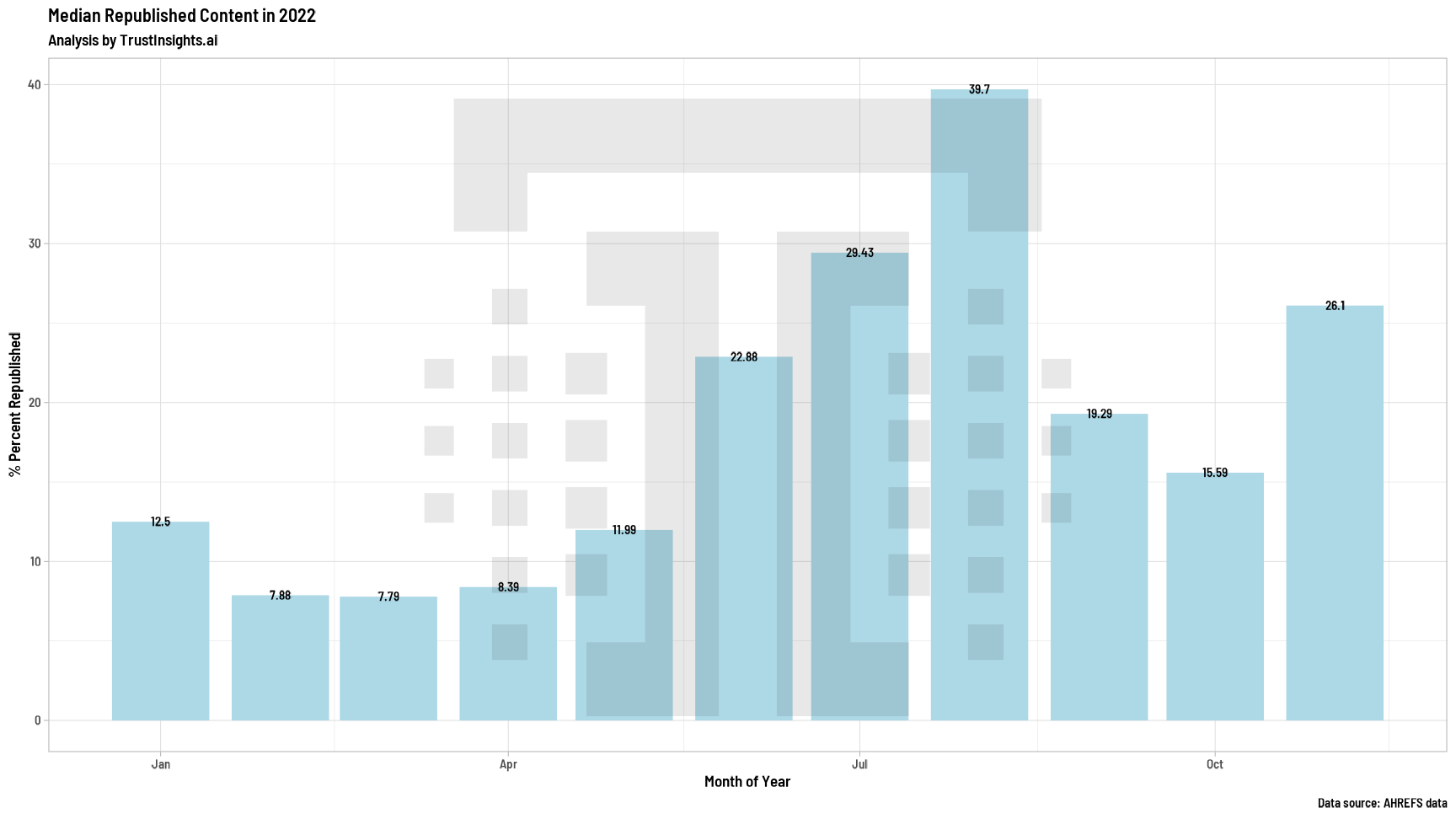
In general, publishers republished approximately 14.2% of all content in 2022. August saw the greatest amount of republishing, with 39.7% of all content recycled. March saw the least amount, with only 7.8% of content republished.
Let’s dig into some of the details to get a better picture of who’s doing the republishing.
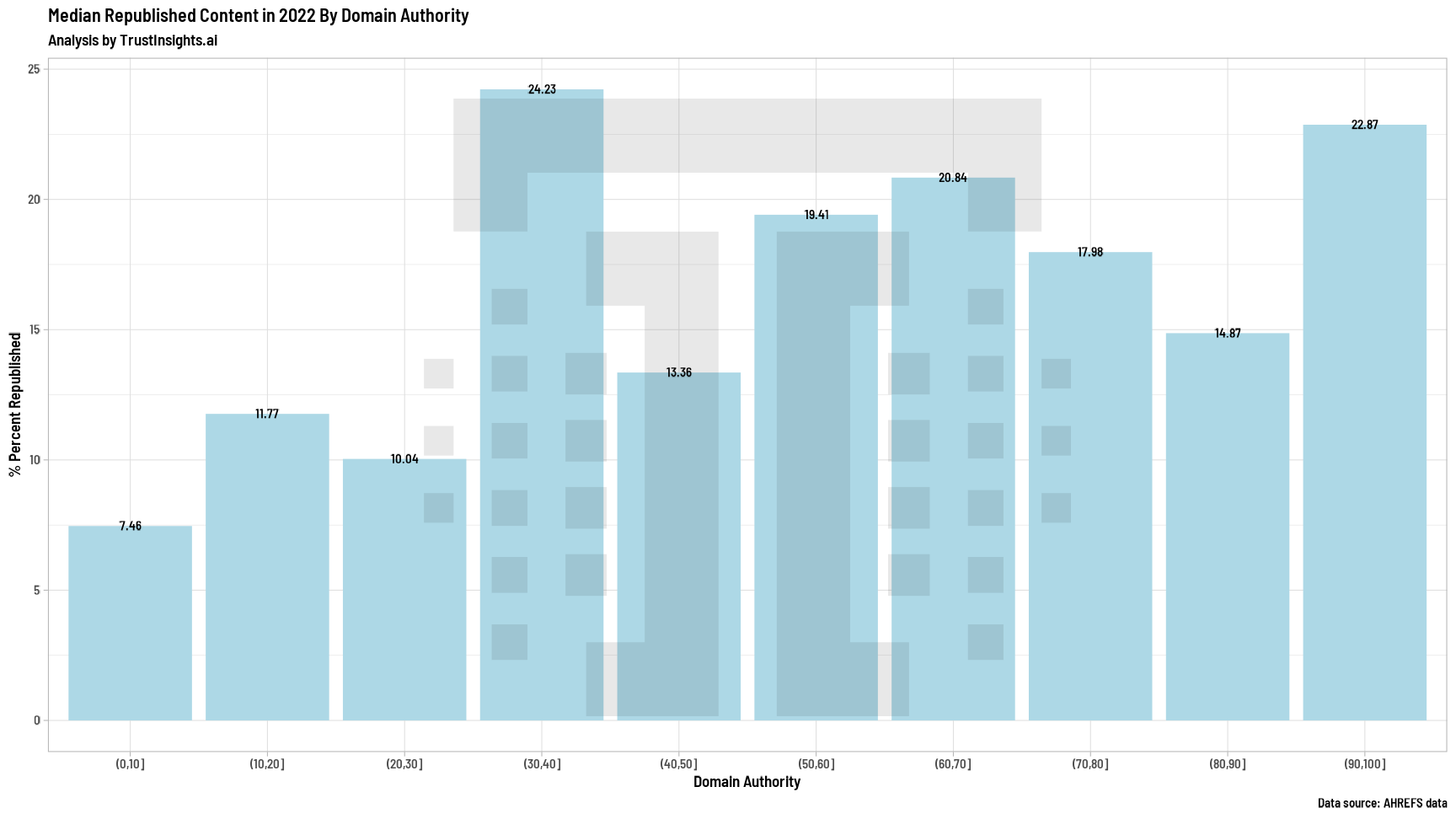
In general, the more authoritative a website (by the AHREFS Domain Authority score), the more that site is likely to republish content.
What kinds of content get recycled?
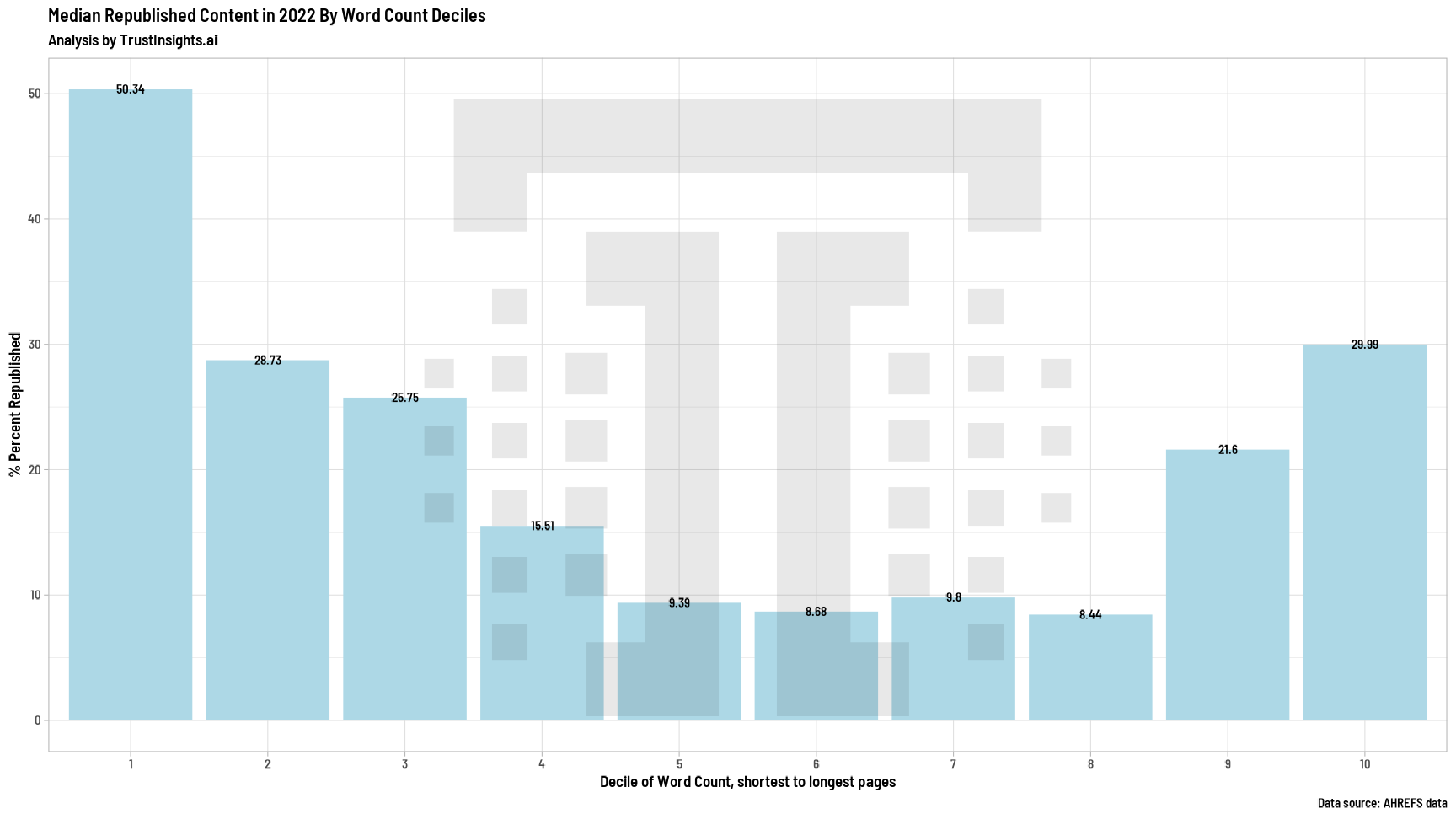
We see republishing done by the shortest and longest pages. 50% of the shortest pages were republished in 2022, and 30% of the longest pages.
What about performance? In general, the more traffic a page has, the more republishing there is:
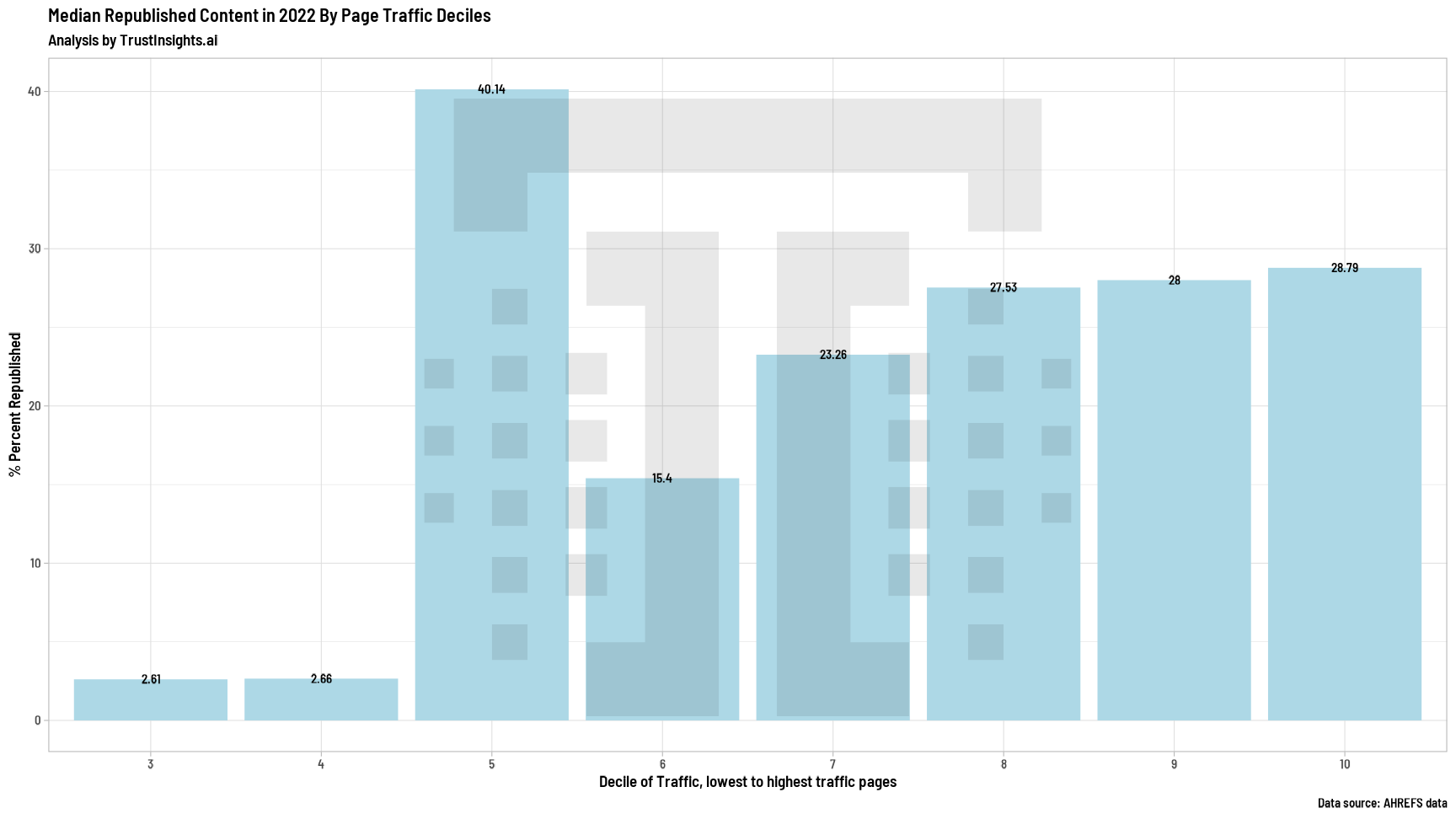
For the highest-traffic individual pages, we see about 27% of the content is republished.
Finally, how old is this content?
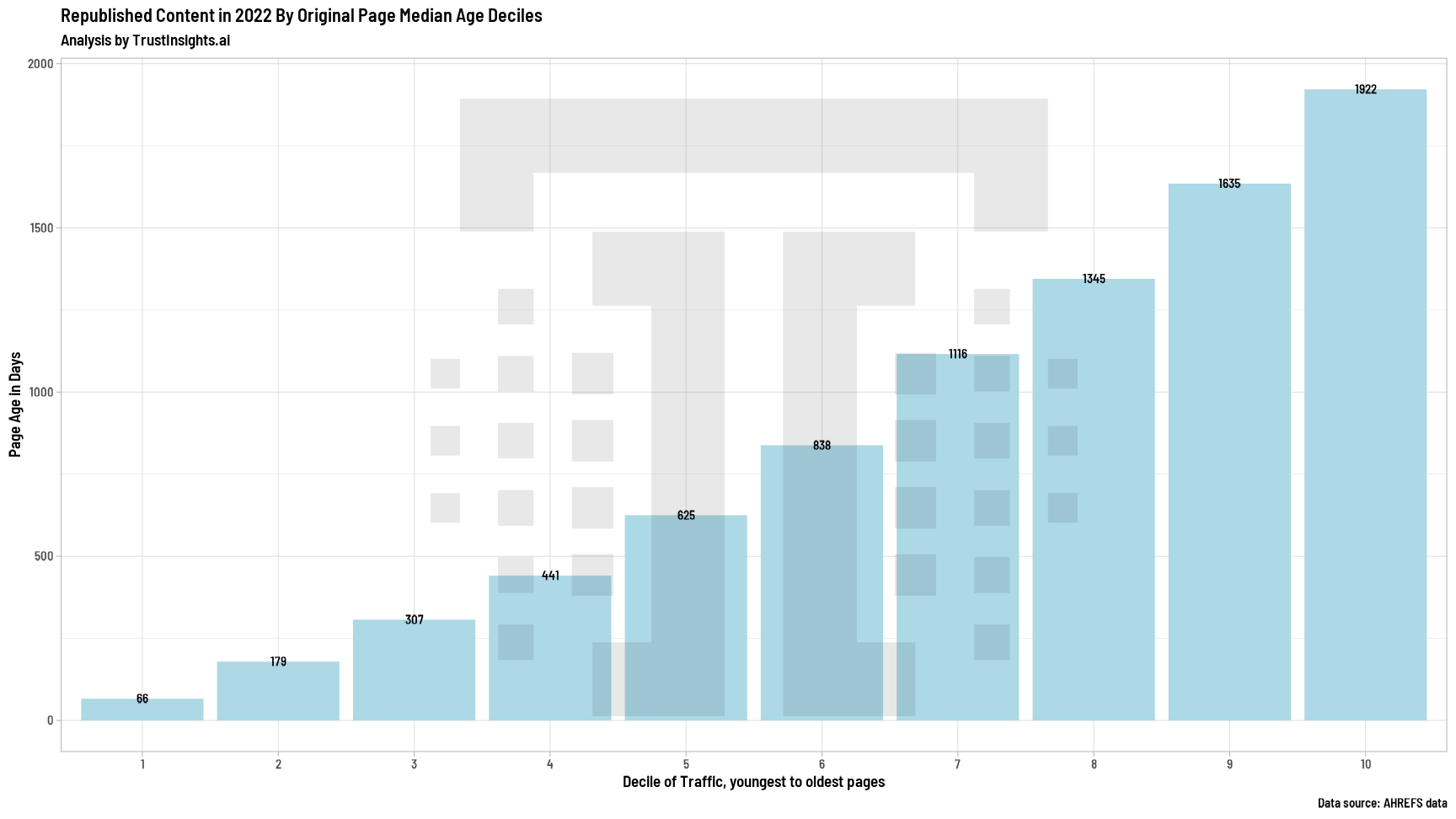
We see that the youngest republished pages have a median of 66 days between their original publication and republishing. The oldest pages? A median of 1922 days – 5.3 YEARS – have passed since the page was originally published.
Finally, let’s answer the biggest question on everyone’s mind: how effective is content republishing?
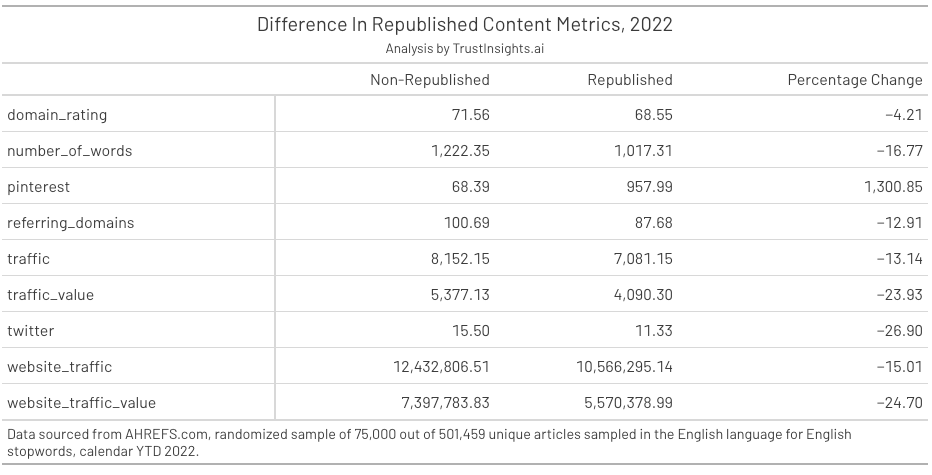
We see a wide gulf in terms of content performance between original content published in 2022 and content republished in 2022:
- Republished content tends to have 16.8% fewer words
- Republished content has an average of 12.9% fewer linking domains
- Republished content earns an average of 13.1% less traffic on a per page basis
These differences suggest that republished content tends to perform less well; these statistics are not far off their 2021 numbers.
So What?
Republishing content is a useful technique to refresh and update old content, but new, original content performs better for the fourth year in a row for traffic – and this year, for inbound linking domains as well.
With this insight, it’s important to weigh the considerations about a republished page versus a new page. If you don’t have the resources to consistently crank out new, high-quality content, republished content is better than poor quality or no content, but it’s less than optimum. If you’re pursuing republishing content as a way to make up for staffing shortfalls, just know that it will not perform as well.
This remains a marketing opportunity for those who excel at creating original content. If you identify a publication in your industry or niche which is relying heavily on republished content just to keep the lights on, you may be able to submit new, original content for publication that is better than what they’re recycling and have a very low bar of entry for your content. That in turn can be used as leverage to publish content on ever-increasing quality publications, as you develop a reputation for being a source of high-quality, original material.
Finally, we would be remiss if we didn’t mention the content generation tools available to marketers now using AI. It’s worth testing to see if AI can generate credible first drafts of net new content, and whether that content outperforms content you’ve republished.
Methodology
Trust Insights used the AHREFS crawling engine to extract 2,592,140 articles from the 2022 index. Pages were selected using English language stopwords with adult content filtered out and homepages of sites filtered out. The dataset was merged, then de-duplicated by article URL. Articles were limited to the English language. he measure of centrality used for this study was the median. The period of the study is January 1, 2022 – December 3, 2022. The date of data extraction is December 4, 2022. Trust Insights is the sole sponsor of the study and neither gave nor received compensation for data used, beyond applicable service fees to software vendors.
[12days2022]
|
Need help with your marketing AI and analytics? |
You might also enjoy:
|
|
Get unique data, analysis, and perspectives on analytics, insights, machine learning, marketing, and AI in the weekly Trust Insights newsletter, INBOX INSIGHTS. Subscribe now for free; new issues every Wednesday! |
Want to learn more about data, analytics, and insights? Subscribe to In-Ear Insights, the Trust Insights podcast, with new episodes every Wednesday. |
Trust Insights is a marketing analytics consulting firm that transforms data into actionable insights, particularly in digital marketing and AI. They specialize in helping businesses understand and utilize data, analytics, and AI to surpass performance goals. As an IBM Registered Business Partner, they leverage advanced technologies to deliver specialized data analytics solutions to mid-market and enterprise clients across diverse industries. Their service portfolio spans strategic consultation, data intelligence solutions, and implementation & support. Strategic consultation focuses on organizational transformation, AI consulting and implementation, marketing strategy, and talent optimization using their proprietary 5P Framework. Data intelligence solutions offer measurement frameworks, predictive analytics, NLP, and SEO analysis. Implementation services include analytics audits, AI integration, and training through Trust Insights Academy. Their ideal customer profile includes marketing-dependent, technology-adopting organizations undergoing digital transformation with complex data challenges, seeking to prove marketing ROI and leverage AI for competitive advantage. Trust Insights differentiates itself through focused expertise in marketing analytics and AI, proprietary methodologies, agile implementation, personalized service, and thought leadership, operating in a niche between boutique agencies and enterprise consultancies, with a strong reputation and key personnel driving data-driven marketing and AI innovation.
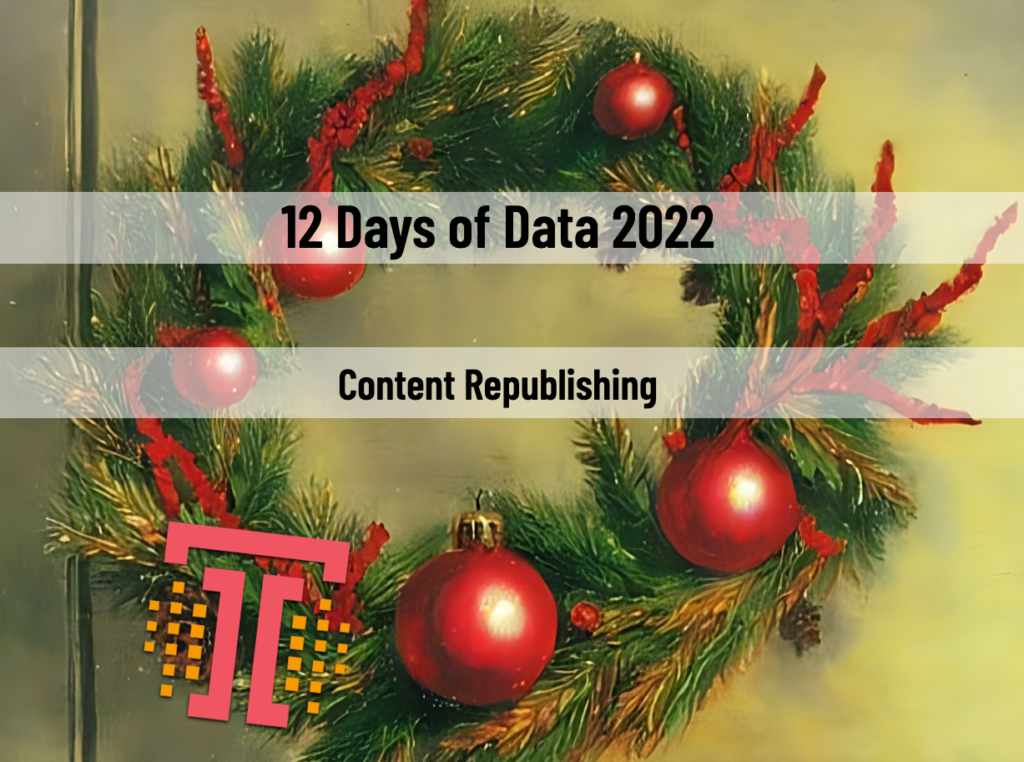








Thank god for this article!!!
A few months ago, I heard that deleting and republishing content can help increase blog traffic because you’re improving the quality of your blog posts. Silly me thought this makes sense so I ended up deleting and republishing blog posts. I lost so much traffic that I’m still sad about it and wondered what I was doing wrong.
I’m glad to know that original content tends to do better. Now that I think about it, a lot of these articles that talk about republishing content was from a few years ago. Maybe it worked better then but it certainly didn’t for me.
It’s an extremely painful lesson so those who can find this article, I also want to warn you before going and deleting/republishing everything.